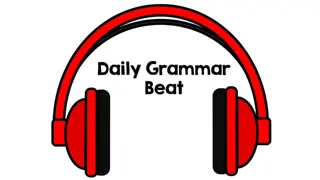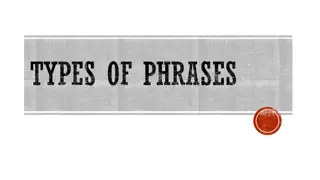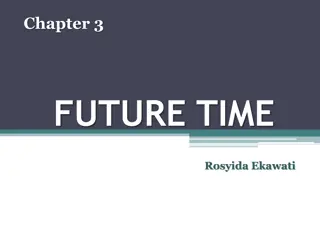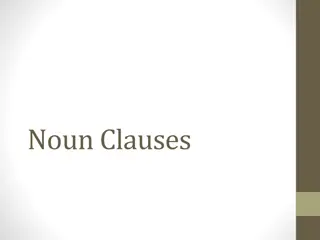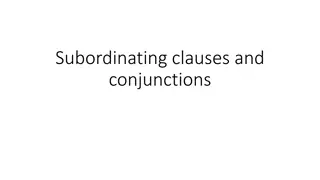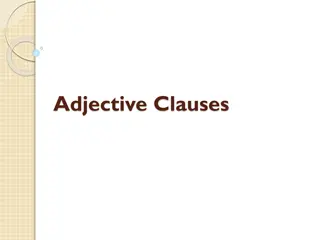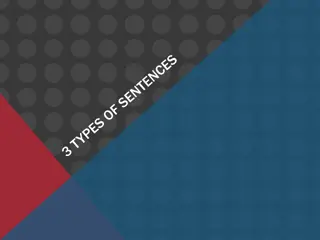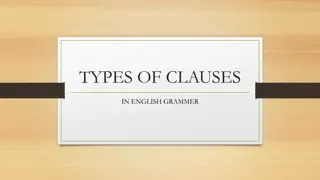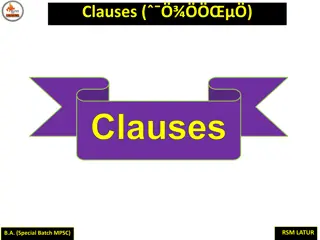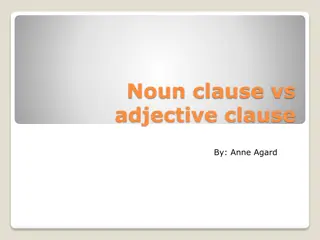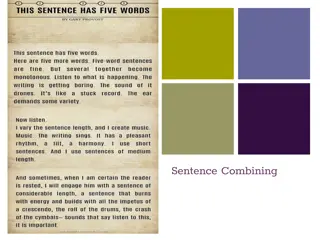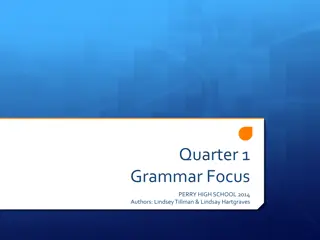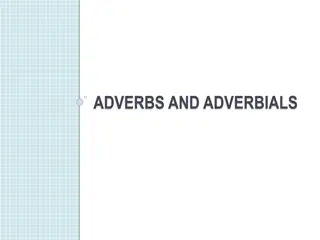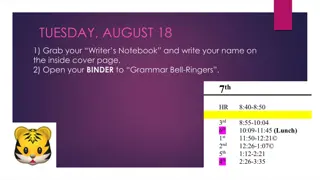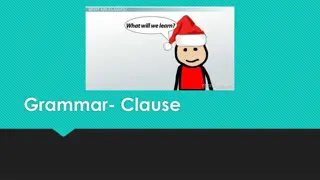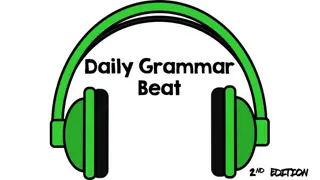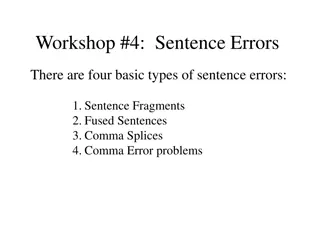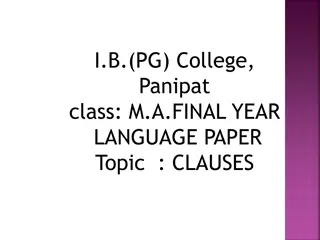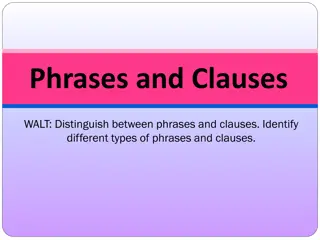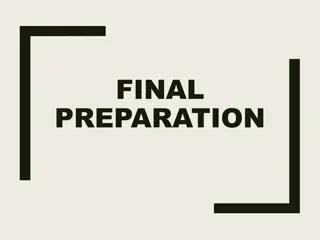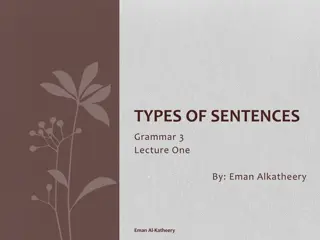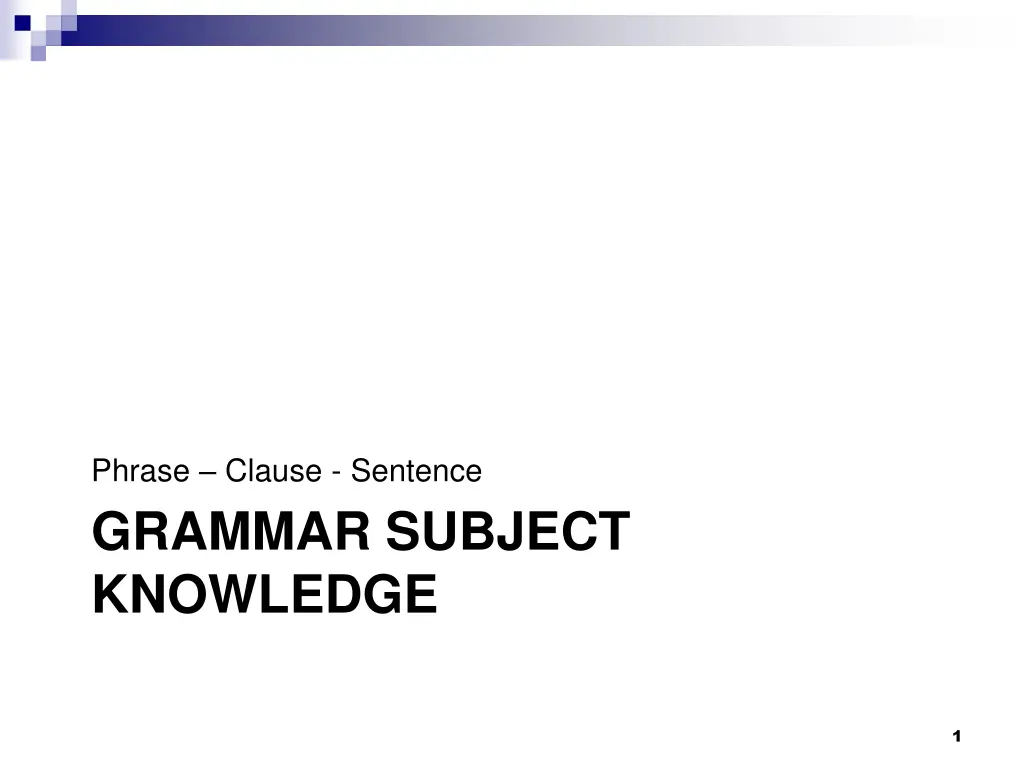
Understanding Phrases, Clauses, and Sentences
Explore the differences between phrases, clauses, and sentences in grammar. Learn how to identify them in sentences using examples from "Beauty and the Beast" by Geraldine McCaughrean. Understand the role of verbs, adverbs, and noun phrases in constructing complete and meaningful sentences. Enhance your grammar subject knowledge with this insightful content.
Download Presentation

Please find below an Image/Link to download the presentation.
The content on the website is provided AS IS for your information and personal use only. It may not be sold, licensed, or shared on other websites without obtaining consent from the author. If you encounter any issues during the download, it is possible that the publisher has removed the file from their server.
You are allowed to download the files provided on this website for personal or commercial use, subject to the condition that they are used lawfully. All files are the property of their respective owners.
The content on the website is provided AS IS for your information and personal use only. It may not be sold, licensed, or shared on other websites without obtaining consent from the author.
E N D
Presentation Transcript
Phrase Clause - Sentence GRAMMAR SUBJECT KNOWLEDGE 1
Phrase, clause, sentence? Beauty and the Beast - Geraldine McCaughrean (2000) Which of the following are phrases? clauses? sentences? though she told herself often Beauty waited the great gilded mirrors is dying the room was pitch dark very warily because she was promised to the beast when the moon shone in at the window Gregor sat down when he looked up he was not out of doors at all in the rose garden, the last scarlet petal of the last rose fell like drops of blood onto the face of beast magic glass at a gallop 3
Phrase, clause, sentence? Beauty and the Beast - Geraldine McCaughrean (2000) Sentences Beauty waited. The room was pitch dark. Gregor sat down. In the rose garden, the last scarlet petal of the last rose fell like drops of blood onto the face of beast. When he looked up he was not out of doors at all. We can say that a sentence: has at least one main/finite verb is a complete grammatical idea (makes sense) requires end punctuation The first four examples above are simple sentences (a single clause with one main/finite verb). Note the different lengths but each has only one verb. The final example is a multi-clause sentence, with two finite verbs looked and was . The subordinating conjunction when makes the first clause a subordinate clause and hence this is a complex sentence. 4
Phrase, clause, sentence? Beauty and the Beast - Geraldine McCaughrean (2000) Clauses Beauty waited. Gregor sat down. The room was pitch dark. In the rose garden, the last scarlet petal of the last rose fell like drops of blood onto the face of beast. As we ve seen, these four are single-clause sentences, each with one verb. though she told herself often because she was promised to the beast when the moon shone in at the window when he looked up These are clauses (subordinate) but not sentences. Each has a verb but none are grammatically complete (they need a main clause) and none makes complete sense. 5
Phrase, clause, sentence? Beauty and the Beast - Geraldine McCaughrean (2000) Phrases is dying a verb phrase very warily an adverbial phrase the great gilded mirrors a noun phrase magic glass a noun phrase at a gallop an adverbial phrase (here, a prepositional phrase, starting with a preposition at ) A phrase is a group of words clustered around a head word. Note the different functions, e.g. a verb phrase indicates aspects of tense: Beauty waited/had been waiting. Gregor sat down/might have been sitting down. an adverbial phrase provides more detail about where, when or how something happens a noun phrase provides descriptive detail, telling us more about the noun that the information relates to 6
Whats in a clause? A clause has a subject and a verb: Beauty waited. In the rose garden, the last scarlet petal of the last rose fell like drops of blood onto the face of beast. when the moon shone into the window though she told herself often TASK: Count how many clauses there are in each of these sentences, identifying the subject and the verb in each clause: Into a forest of fifty thousand trees rode a lone traveller. Overhead, the moon was a smoking mirror. When it disappeared behind a monstrous paw of cloud, so did Gregor s path, and he was utterly lost. 7
Slots in a clause Subject Verb Object Adverbial Complement (adjective/noun/noun phrase) Gregor ate bread greedily. Beauty s father was eating the freshly baked bread in the sumptuous palace. Into a forest of fifty thousand trees rode a lone traveller. Overhead, the moon was a smoking mirror.
Phrase, Clause or Sentence? Which is which? phrase? the noise was driving Peter crazy sentence? in the west of the city beneath their crystal skies who had lived all his life in narrow streets life was so peaceful when it rained the only house summer grew weary clause? from The Paradise Garden by Colin Thompson
Big Ideas: Phrase, clause, sentence A sentence: Has at least a subject and a verb e.g Beauty waited. The verb is finite (has person and tense). Has at least one clause (single-clause sentence) but may have more (multi-clause sentence): When he looked up, he was not out of doors at all. Begins with a capital letter and finishes with end punctuation .
Big Ideas: Phrase, clause, sentence A clause: Has to have a verb (finite or non-finite) and usually has a subject although this may be implied. May make grammatical sense on its own and be a single clause/simple sentence OR a main clause in a multi-clause sentence. Eg Gregor ate bread because he was hungry. May start with a subordinating conjunction eg if, because, when, although. This type of clause (subordinate) is dependent on a main clause to make complete grammatical sense eg Gregor ate bread because he was hungry.
Big Ideas: Phrase, clause, sentence A phrase: is a group of words clustered around a head word. The head word give the phase its name e.g noun phrase - his horse; adverbial phrase very warily; fills a slot in a clause e.g SVOAC; a verb phrase can fill the verb slot instead of a single word verb e.g is eating, has been eating, could have been eaten
Resources to help you Essential Primary Grammar: Myhill, Jones, Watson & Lines (2016) No Nonsense Grammar: Babcock LDP Literacy Team, Raintree (2016) www.babcock-education.co.uk/ldp/literacy

